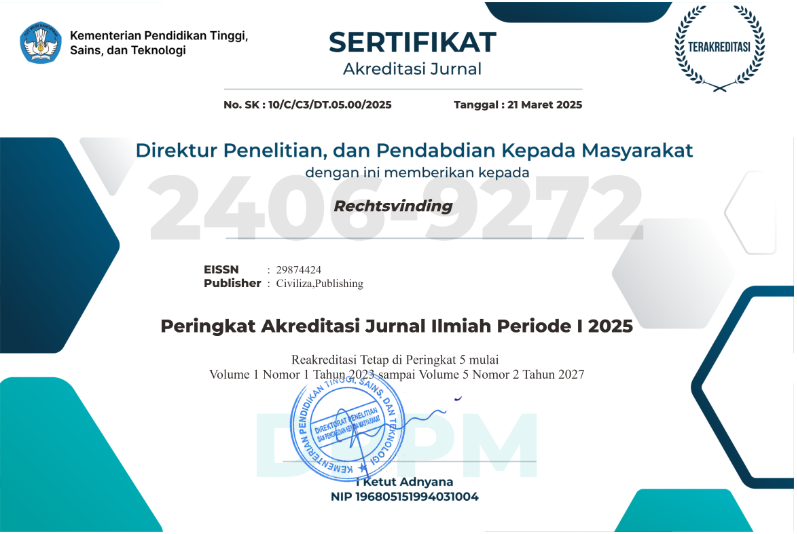The Relevance of Islam in Indonesian Politics: A Study of the Integration and Sustainability of the Role of the Muslim Ummah
DOI:
https://doi.org/10.59525/rechtsvinding.v1i2.408Keywords:
Politic; Indonesia; Islam; HistoricalAbstract
This research explains the dynamic perspective of Islam and politics in Indonesia. The relationship between Islam and the political situation in Indonesia is not always harmonious. Using qualitative methods through literature study, this research resulted in the conclusion that the indications of Islam and politics are two aspects that are integrated in its development which has never been interrupted from the previous period. The existence of Islam in Indonesia is largely determined by the conditions of goals established by the Muslim community itself through qualifications and political capacity with an insight into the intellectual formation of its people. The condition of Muslims today is indeed progressing, but as a political institution it has experienced a setback. Therefore, discussions on Islamic and political issues are increasingly felt as urgent by Muslims themselves. The engineering of the discussion and its implementation includes a contextual understanding of Islamic doctrine with the nation's political growth, a coaching system that can liberate the people from material and spiritual backwardness, as well as leadership that is not only charismatic, but also dedicated and professional.
References
Ayoob, M., & Lussier, D. N. (2020). The Many faces of political Islam: Religion and politics in Muslim societies. University of Michigan Press.
Amirullah, A. (2024). Sejarah penulisan Alquran dalam kitab Shahih Bukhari: Studi Historiografi Islam. Islamic Literature: Journal of Islamic Civilisations, 1(1), 73-83.
Demant, P. R. (2006). Islam vs. Islamism: The dilemma of the Muslim world. Bloomsbury Publishing USA.
Hayati, A., Yunus, A. R., & Santalia, I. (2023). The Acculturation of Local and Islamic Culture in the Pattorani Tradition on Masalima Island, Pangkep Regency. International Journal of Islamic Studies, 3(2), 130-143.
Kuran, T. (2018). Islam and economic performance: Historical and contemporary links. Journal of Economic Literature, 56(4), 1292-1359.
Mahanani, Q. D., Marintan, M. A., Dewi, I. A. K., & Fuadi, M. A. (2022). Islam dan Politik di Indonesia. Jurnal al-Isnad, 3(1).
Mahanani, dkk. (2022). Islam and Politics in Indonesia: Historical Perspective. Al-Isnad: Journal of Islamic Civilization History and Humanities, 3(1), 61-69.
Nasr, V. (2009). The rise of Islamic capitalism: Why the new Muslim middle class is the key to defeating extremism. Simon and Schuster.
Nurhadi, A., Budiyanto, A., & Murtiyoko, H. (2022). Kualitas Layanan Elektronik: Suatu Tinjauan Literatur. Jurnal Pemasaran Kompetitif, 5(3), 308.
Surpani, S. (2023). Dinamika Islam Indonesia: Islam dan Politik di Indonesia. Dialektika Publik, 7(2), 1-12.
Wahid, K. A. (2010). Prisma Pemikiran Gus Dur. LKIS Pelangi Aksara.
Downloads
Published
How to Cite
Issue
Section
License
Copyright (c) 2023 Amirullah Amirullah

This work is licensed under a Creative Commons Attribution 4.0 International License.








